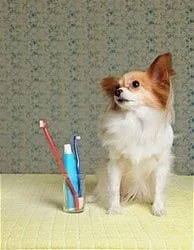
DENTAL HEALTH IS CRUCIAL !
The most important factor in maintaining optimum health for your pet is oral hygiene. Can you imagine what your mouth, breath, and teeth would be like if you never brushed them? Periodontal disease is present in 80% of dogs and 70% of cats over 2 years of age. Bacteria accumulate in the periodontal tissues. This manifests itself to the naked eye as swelling of the gum tissue, redness, and plaque formation on the teeth. Bacteria are constantly released into the blood stream affecting the liver, kidney, and heart. If it is not addressed promptly, it can lead to severe consequences for your pet.
Non-Anesthetic Dentistry (NAD): We used to offer this service for those pets that could not handle general anesthesia or that have minimal tartar. What we discovered was this.................the owners felt better about not putting their pets under anesthesia to have the teeth taken care of, but this was a cosmetic procedure only and offered NO medical benefit. In fact, many of the pets have seen that have done NAD elsewhere require multiple extractions when they are anesthetized to care for the teeth properly. Since NAD was something that we could not support fully from a medical standpoint, we decided to discontinue this service.
What happens during a dental procedure? Your pet will be gently placed under anesthesia. This prevents your pet from struggling during the oral evaluation. The doctor and RVT examine and probe each tooth individually, noting any changes in the periodontal pocket depth as well as looking for any cracked, chipped, or broken teeth. In addition, the entire oral cavity is examined including the tonsils, soft and hard palate, tongue, cheeks, and vocal chords. This exam sometimes reveals abnormalities that can be easily handled during the treatment. We make sure that your pet is comfortable and safe during the entire procedure.
The doctor will make every attempt possible to contact you while your pet is under anesthesia, to discuss the findings and recommend a course of action. Dental digital radiography is always recommended in order to determine if the tooth roots are viable or infected. It is possible that extractions may be necessary. If that is the case, extractions are done in exactly the same manner as they would be for you or me. A local anesthetic block is administered which will last long after your pet awakens. The affected tooth or teeth are gently, but effectively extracted and follow up xrays are done to make sure all of the tooth root remnants have been removed.
Pain medications, as well as anti-inflammatories and antibiotics are usually given by injection and also prescribed for your pet on discharge. A veterinary dental sealant (SANOS) is then applied to all the teeth to prevent plaque formation. After the dental procedure has been completed and the anesthesia has worm off, your pet is usually back to their normal self within minutes.
This is a critical, but necessary medical health procedure for your pet. The video above will give you an an appreciation of what can happen if periodontal disease is left unchecked. Call us today to schedule your pet's dental evaluation!
Isn't anesthesia risky for my pet ?
Anesthetic risk is always present, but if proper pre-anesthetic testing and evaluation is done, the risk of anesthesia is very low (roughly 1 in 2,000). Everyone is concerned about anesthetic risk, especially the doctors and the para-professional staff. We use the latest in anesthetic monitoring equipment to insure your pet's safety. In addition, a veterinary nurse is with your pet before, during, and after the anesthetic procedure to monitor for any possible complication. Remember, anesthesia is a health related risk, not an age related risk. We anesthetize elderly patients often, with minimal complications.